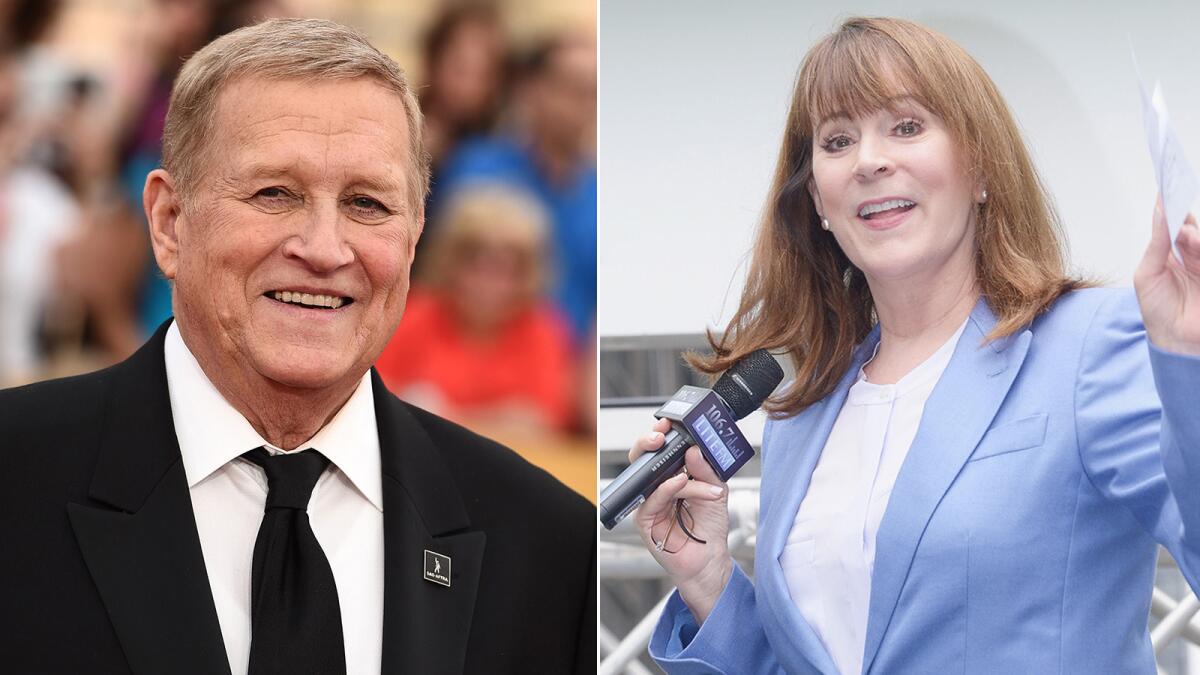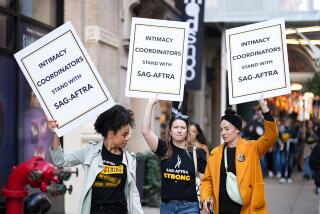SAG-AFTRA election reflects fears over actors’ pay for online shows

Ken Howard, the president of SAG-AFTRA, faces challenger Patricia Richardson, the actress who played the mom in the 1990s sitcom “Home Improvement.”
A behind-the-scenes drama is playing out in Hollywood, one that has pitted America’s best-known home improvement mom against the White Shadow.
Actors, extras, stunt people and other performers are once again squaring off over who should lead their union in an unusually close election that has highlighted growing anxieties over how talent is compensated in the Internet age.
The outcome that will be decided Aug. 20 could mark a change of course for Hollywood’s largest entertainment union and a return to a more contentious period in labor relations with the major studios.
SIGN UP for the free Indie Focus movies newsletter >>
In one corner is Ken Howard, the current president of SAG-AFTRA. The veteran actor and star of the 1970s TV show “The White Shadow” is seeking another term as president of a union with a budget of about $100 million and representing 160,000 actors, recording artists, broadcasters and other performers. He’s facing Patricia Richardson, who played the mom in the 1990s sitcom “Home Improvement.”
Howard leads a faction of moderates called Unite for Strength that successfully pushed for the historic merger of the Screen Actors Guild with the American Federation of Television and Radio Artists in 2012 that clashed over turf and negotiating strategy. He is credited by his supporters, who include Tom Hanks and George Clooney, with bringing stability and unity to a union once riven with ideological conflict.
“At this moment in our union’s history — a time of profound change — it is more crucial than ever to elect leaders who deliver tangible results, not just empty promises,” Howard wrote in a recent email to his colleagues.
But Howard, who was first elected in 2009, is facing an unexpectedly strong challenge from Richardson. The actress is backed by a more strident group called Membership First that opposed the 2012 merger and has accused Howard’s slate of being too soft on management. Richardson has her own roster of A-list backers, including Ed Harris and Martin Sheen.
She’s also drawn support from the stunt performers — her running mate is veteran stuntwoman Jane Austin, who is running for secretary treasurer. “We need strong leadership that isn’t afraid to speak truth to power and be tenacious in negotiations,” Richardson wrote in an email to members.
Such comments are likely to resonate among many actors, who’ve grown increasingly worried about the sweeping changes in how entertainment is delivered and consumed.
Although streaming services such as Netflix have created a flood of new jobs, many actors feel they’ve been left behind by the digital revolution. The shift toward lower-cost online production has dramatically changed how actors are compensated, especially when it comes to residuals, the fees they receive when shows are rerun. New media residuals, if they exist at all, are typically a fraction of those actors received in the halcyon days of network television.
“As streaming takes off, it means the traditional means of income is making up a smaller share of the pie for these actors,” said David Smith, a labor economist at Pepperdine University. “It’s not surprising that there would be a group rising up in light of economic challenges to say, ‘Hey, we should try a different approach and dig our heels in.’”
In an election in which votes are often driven by celebrity clout, Richardson’s candidacy has breathed new life into a group that has been largely marginalized following a string of election defeats in recent years. Membership First currently holds a small minority of seats on the 70-member national board, in which 45 seats are up for grabs in the election.
The last time Membership First held power was with the 2005 election of Alan Rosenberg, a controversial figure who presided over a period of turmoil at the guild marked by clashes with board dissidents, AFTRA and the major studios, which were locked in a months-long standoff with SAG.
Richardson is projecting a kindler, gentler image, refusing to directly criticize Howard and stressing common ground with former opponents and members who aren’t actors. That’s a marked contrast to some of her peers, who only a few years ago disparaged the idea of joining forces with broadcasters, recording artists and others who belonged to the more diverse AFTRA.
“The most important thing I’ve been saying to everyone in my group is that the merger is here, it’s done and there are some really good things about it, so it’s useless to go back to what happened,” Richardson said in an interview. “I’m not here to fight with Ken Howard.... I’m hoping we can have past hurts be healed, so I don’t really want to create new ones.”
Yet, Richardson and her supporters have also taken not-so-subtle digs at current leaders for their handling of contract negotiations. The previous three-year film and TV contract, which was overwhelmingly approved by the union’s members last summer, provided modest wage hikes, a uniform set of terms for basic cable television, and TV pay rates for high-budget Internet shows like Netflix’s “House of Cards.”
But Richardson said negotiators could have done better by, for example, securing higher residuals for basic cable TV shows and residuals for lower-budget new media shows.
Her supporters have seized on an email — among the trove of hacked communications posted on WikiLeaks — that quotes a Sony executive as saying the SAG-AFTRA negotiations “were successful for the studios” and represented a “big for win for us.”
Howard says the Sony email was taken out of context. He notes other emails published by WikiLeaks paint a different picture. And he strenuously defends his record, saying the union has successfully unionized workers at radio and television stations nationwide while securing contract gains for all members.
“These were incredibly successful negotiations,” he said, noting such benefits as bringing disparate TV contracts under a single agreement. “It’s easy to say, ‘Well you could have gotten more gains.’ Membership First couldn’t even get a contract done. It was a disaster.”
Howard acknowledges the union has been slow to make good on a long-standing pledge to merge SAG-AFTRA health and pension plans — another complaint cited by opponents — but said progress is being made.
Adding to the intrigue of the election is the fact that Howard’s previous running mate, Amy Aquino — who was a key architect of the merger and has served as secretary treasurer — has had a falling out with her former ally. This time Howard’s running mate is actress Jenny O’Hara, a regular on the TV series “The Mindy Project” who also starred in the M. Night Shyamalan movie “Devil.”
Aquino, the former “ER” regular who currently stars in the Amazon Studios TV series “Bosch,” is not endorsing either candidate for president. She’s running for a seat on the national board as an independent candidate.
“What is critical for the union now is diversity of thought and leadership,” Aquino wrote in a recent email to members. “We need respect for the democratic process, and a board that welcomes dissenting opinions, fosters debate and nurtures the collectivism that defines a healthy labor organization.”
------------------
MORE:
Paramount’s home video release plan is panned by theater chains
MSNBC opens daytime hours for breaking news; Brian Williams will helm
Relativity Media spirals into bankruptcy; on the hunt for a buyer
More to Read
From the Oscars to the Emmys.
Get the Envelope newsletter for exclusive awards season coverage, behind-the-scenes stories from the Envelope podcast and columnist Glenn Whipp’s must-read analysis.
You may occasionally receive promotional content from the Los Angeles Times.









